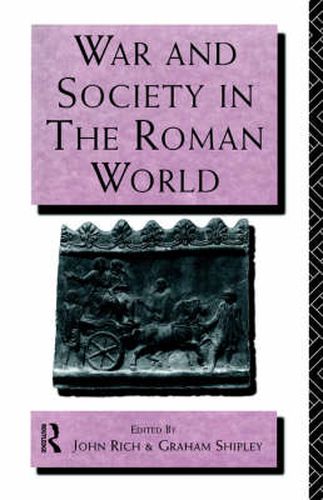Readings Newsletter
Become a Readings Member to make your shopping experience even easier.
Sign in or sign up for free!
You’re not far away from qualifying for FREE standard shipping within Australia
You’ve qualified for FREE standard shipping within Australia
The cart is loading…






In the ancient world war played a crucial part in shaping and changing social and political structures. The impact of war on ancient society is the subject of this book and the companion volume, War and Society in the Greek World . Earlier studies of ancient warfare have concentrated on political causes, tactics strategy and military organization. In these volumes warfare is viewed rather as a species of social action, affecting (and affected by) social conditions and ideologies, and having social, economic and cultural consequences. The cental theme of this volume is the shifting relationship between warfare and the Roman citizen body. The dominant role of war in Roman life under the Republic is examined, together with the related themes of Roman expansion and its consequences both for the Romans and for those they conquered. Under the Principate expansion largely stopped, and the inhabitants of the empire enjoyed the Roman peace, protected by a professional army. A number of chapters focus on these changes, explaining how they came about, analysing their effect on attitudes to war and probing the extent to which the peace was a reality. The Late Empire is studied in the final chapters, which document the rise of warlords and, in the west, the finhal disappearance of the Roman army. This volume will be of great interest to all those concerned with Roman history, or more generally with the relationship between warfare and historical societies.
$9.00 standard shipping within Australia
FREE standard shipping within Australia for orders over $100.00
Express & International shipping calculated at checkout
In the ancient world war played a crucial part in shaping and changing social and political structures. The impact of war on ancient society is the subject of this book and the companion volume, War and Society in the Greek World . Earlier studies of ancient warfare have concentrated on political causes, tactics strategy and military organization. In these volumes warfare is viewed rather as a species of social action, affecting (and affected by) social conditions and ideologies, and having social, economic and cultural consequences. The cental theme of this volume is the shifting relationship between warfare and the Roman citizen body. The dominant role of war in Roman life under the Republic is examined, together with the related themes of Roman expansion and its consequences both for the Romans and for those they conquered. Under the Principate expansion largely stopped, and the inhabitants of the empire enjoyed the Roman peace, protected by a professional army. A number of chapters focus on these changes, explaining how they came about, analysing their effect on attitudes to war and probing the extent to which the peace was a reality. The Late Empire is studied in the final chapters, which document the rise of warlords and, in the west, the finhal disappearance of the Roman army. This volume will be of great interest to all those concerned with Roman history, or more generally with the relationship between warfare and historical societies.